
FACULTY OF ENGINEERING
Department of Civil Engineering
CIVE 305 | Course Introduction and Application Information
| Course Name |
Hydromechanics
|
|
Code
|
Semester
|
Theory
(hour/week) |
Application/Lab
(hour/week) |
Local Credits
|
ECTS
|
|
CIVE 305
|
Fall
|
3
|
2
|
4
|
6
|
| Prerequisites |
|
|||||||
| Course Language |
English
|
|||||||
| Course Type |
Required
|
|||||||
| Course Level |
First Cycle
|
|||||||
| Mode of Delivery | face to face | |||||||
| Teaching Methods and Techniques of the Course | Group WorkProblem SolvingApplication: Experiment / Laboratory / WorkshopLecture / Presentation | |||||||
| Course Coordinator | ||||||||
| Course Lecturer(s) | ||||||||
| Assistant(s) | ||||||||
| Course Objectives | The objective of the course is practicing basic fluid mechanics principles, is to teach solution of various pipeline and open channel problems by using continuity, momentum and energy equations and to discuss the design of hydraulic structures. |
| Learning Outcomes |
The students who succeeded in this course;
|
| Course Description | In this course, an overview of hydromechanics is given. The course covers the principles of pipe flow hydraulics. The solution methods of open channel flow hydraulics, water surface profiles and flow control is planned to discuss. |
|
|
Core Courses | |
| Major Area Courses |
X
|
|
| Supportive Courses | ||
| Media and Management Skills Courses | ||
| Transferable Skill Courses |
WEEKLY SUBJECTS AND RELATED PREPARATION STUDIES
| Week | Subjects | Related Preparation |
| 1 | Review of Fluid Mechanics Laminar and turbulent flows History of Hydromechanics | Chapter-1-7 : Çengel, Y.A., Cimbala, J.M. 2006. Fluid mechanics: Fundamentals and applications. 4rd ed. McGraw-Hill., 2018. |
| 2 | Flow in closed conduits Continuity and motion equations in pipes | Chapter-8 : Çengel, Y.A., Cimbala, J.M. 2006. Fluid mechanics: Fundamentals and applications. 4rd ed. McGraw-Hill., 2018. |
| 3 | Velocity profiles at different flow regimes Energy losses in pipes Major losses in pipes | Chapter-8 :Çengel, Y.A., Cimbala, J.M. 2006. Fluid mechanics: Fundamentals and applications. 4rd ed. McGraw-Hill., 2018. |
| 4 | Minor losses in pipes Pipe systems | Chapter-8 : Çengel, Y.A., Cimbala, J.M. 2006. Fluid mechanics: Fundamentals and applications. 4rd ed. McGraw-Hill., 2018. |
| 5 | Flow rate and velocity measurement | Chapter-8 and 14 : Çengel, Y.A., Cimbala, J.M. 2006. Fluid mechanics: Fundamentals and applications. 4rd ed. McGraw-Hill., 2018. |
| 6 | Differential analysis of fluid flow.Naiver-Strokes equation | Chapter-9-10 : Çengel, Y.A., Cimbala, J.M. 2006. Fluid mechanics: Fundamentals and applications. 4rd ed. McGraw-Hill., 2018. |
| 7 | Midterm Exam | |
| 8 | Open channel hydraulics Flow types Best hydraulic section Max. flow discharge and max. flow velocity | Chapter-13 : Çengel, Y.A., Cimbala, J.M. 2006. Fluid mechanics: Fundamentals and applications. 4rd ed. McGraw-Hill., 2018.Chapter-3: Güney M.Ş.,Laboratuvar Uygulamalı Hidrolik DEÜ Mühendislik Fakültesi Yayınları No:322 İzmir, 2013 |
| 9 | Specific energy concept in open channels Specific energy-flow depth relation Flow discharge-flow depth relation Subcritical and supercritical flow regimes | Chapter-13 : Çengel, Y.A., Cimbala, J.M. 2006. Fluid mechanics: Fundamentals and applications. 4rd ed. McGraw-Hill., 2018. |
| 10 | Computation of non-uniform flow Differential equation of water surface profile Hydraulic jump | Chapter-13 : Çengel, Y.A., Cimbala, J.M. 2006. Fluid mechanics: Fundamentals and applications. 4rd ed. McGraw-Hill., 2018.. |
| 11 | Effect of cross-section variations on water surface profile | Chapter 13: Çengel, Y.A., Cimbala, J.M. 2006. Fluid mechanics: Fundamentals and applications. 4rd ed. McGraw-Hill., 2018.Chapter-3: Güney M.Ş.,Laboratuvar Uygulamalı Hidrolik DEÜ Mühendislik Fakültesi Yayınları No:322 İzmir, 2013 |
| 12 | Mathematical study of cross-section changes problems in open channels Calculation of heterogeneous channels Orifices and nozzles, gates | Chapter-13 : Çengel, Y.A., Cimbala, J.M. 2006. Fluid mechanics: Fundamentals and applications. 4rd ed. McGraw-Hill., 2018.Chapter-3 and 4: Güney M.Ş.,Laboratuvar Uygulamalı Hidrolik DEÜ Mühendislik Fakültesi Yayınları No:322 İzmir, 2013 |
| 13 | Flow control and measurement.2nd midterm exam. | Chapter-13 : Çengel, Y.A., Cimbala, J.M. 2006. Fluid mechanics: Fundamentals and applications. 4rd ed. McGraw-Hill., 2018.Chapter-4: Güney M.Ş.,Laboratuvar Uygulamalı Hidrolik DEÜ Mühendislik Fakültesi Yayınları No:322 İzmir, 2013 |
| 14 | External flow.Drag and Lift | Chapter-11 : Çengel, Y.A., Cimbala, J.M. 2006. Fluid mechanics: Fundamentals and applications. 4rd ed. McGraw-Hill., 2018. |
| 15 | Semester Review | |
| 16 | Final Exam |
| Course Notes/Textbooks | Çengel, Y.A., Cimbala, J.M. 2006. Fluid mechanics: Fundamentals and applications. 4rd ed. McGraw-Hill., 2018. ISBN: 978935316 6212
|
| Suggested Readings/Materials | White, F.M.,Fluid Mechanics, McGraw Hill , New York , Sixth Edition., 2006, ISBN: 9780072938449 Güney M. Ş., Laboratuar Uygulamalı Hidrolik DEÜ Mühendislik Fakültesi Yayınları No:322, İzmir, 2013, ISBN: 9789754414097 |
EVALUATION SYSTEM
| Semester Activities | Number | Weigthing |
| Participation | ||
| Laboratory / Application |
1
|
10
|
| Field Work | ||
| Quizzes / Studio Critiques |
1
|
10
|
| Portfolio | ||
| Homework / Assignments | ||
| Presentation / Jury |
-
|
-
|
| Project | ||
| Seminar / Workshop | ||
| Oral Exams | ||
| Midterm |
2
|
40
|
| Final Exam |
1
|
40
|
| Total |
| Weighting of Semester Activities on the Final Grade |
4
|
60
|
| Weighting of End-of-Semester Activities on the Final Grade |
1
|
40
|
| Total |
ECTS / WORKLOAD TABLE
| Semester Activities | Number | Duration (Hours) | Workload |
|---|---|---|---|
| Theoretical Course Hours (Including exam week: 16 x total hours) |
16
|
3
|
48
|
| Laboratory / Application Hours (Including exam week: '.16.' x total hours) |
16
|
2
|
32
|
| Study Hours Out of Class |
14
|
2
|
28
|
| Field Work |
0
|
||
| Quizzes / Studio Critiques |
1
|
10
|
10
|
| Portfolio |
0
|
||
| Homework / Assignments |
0
|
||
| Presentation / Jury |
-
|
-
|
0
|
| Project |
0
|
||
| Seminar / Workshop |
0
|
||
| Oral Exam |
0
|
||
| Midterms |
2
|
15
|
30
|
| Final Exam |
1
|
32
|
32
|
| Total |
180
|
COURSE LEARNING OUTCOMES AND PROGRAM QUALIFICATIONS RELATIONSHIP
|
#
|
Program Competencies/Outcomes |
* Contribution Level
|
||||
|
1
|
2
|
3
|
4
|
5
|
||
| 1 | To have adequate knowledge in Mathematics, Science and Civil Engineering; to be able to use theoretical and applied information in these areas on complex engineering problems. |
|||||
| 2 | To be able to identify, define, formulate, and solve complex Civil Engineering problems; to be able to select and apply proper analysis and modeling methods for this purpose. |
|||||
| 3 | To be able to design a complex system, process, device or product under realistic constraints and conditions, in such a way as to meet the requirements; to be able to apply modern design methods for this purpose. |
X | ||||
| 4 | To be able to devise, select, and use modern techniques and tools needed for analysis and solution of complex problems in engineering applications. |
X | ||||
| 5 | To be able to design and conduct experiments, gather data, analyze and interpret results for investigating complex engineering problems or Civil Engineering research topics. |
X | ||||
| 6 | To be able to work efficiently in Civil Engineering disciplinary and multi-disciplinary teams; to be able to work individually. |
|||||
| 7 | To be able to communicate effectively in Turkish, both orally and in writing; to be able to author and comprehend written reports, to be able to prepare design and implementation reports, to present effectively, to be able to give and receive clear and comprehensible instructions. |
|||||
| 8 | To have knowledge about global and social impact of engineering practices on health, environment, and safety; to have knowledge about contemporary issues as they pertain to engineering; to be aware of the legal ramifications of engineering solutions. |
|||||
| 9 | To be aware of ethical behavior, professional and ethical responsibility; to have knowledge about standards utilized in engineering applications. |
|||||
| 10 | To have knowledge about industrial practices such as project management, risk management, and change management; to have awareness of entrepreneurship and innovation; to have knowledge about sustainable development. |
|||||
| 11 | To be able to collect data in the area of Civil Engineering, and to be able to communicate with colleagues in a foreign language; |
|||||
| 12 | To be able to speak a second foreign language at a medium level of fluency efficiently. |
|||||
| 13 | To recognize the need for lifelong learning; to be able to access information, to be able to stay current with developments in science and technology; to be able to relate the knowledge accumulated throughout the human history to Civil Engineering. |
|||||
*1 Lowest, 2 Low, 3 Average, 4 High, 5 Highest
NEWS |ALL NEWS
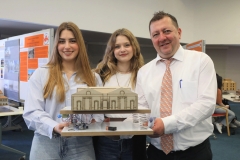
They examined building, showcased their models
Izmir University of Economics (IUE) Department of Civil Engineering and Architecture students examined 58 buildings in Izmir in terms of earthquake resistance
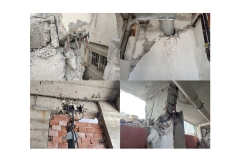
Photos of neglect
Asst. Prof. Dr. Egemen Sönmez, Lecturer at Department of Civil Engineering, Izmir University of Economics (IUE), went to the earthquake zone with
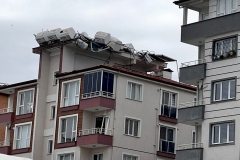
Exterior additions on buildings: cause for concern
Prof. Dr. Celalettin Kozanoğlu, Head of Department of Civil Engineering, Izmir University of Economics (IUE), warned about the water tanks placed on
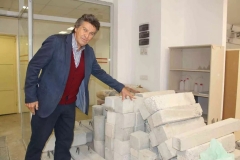
We should take advantage of industrial building technology
Building tests and urban transformation works gained momentum throughout Turkey after the earthquake disaster, the epicenter of which was Kahramanmaraş and killed
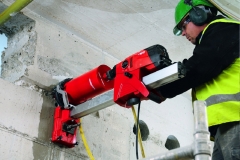
Vital warnings in building inspections
After the earthquake disaster, the epicenter of which was Kahramanmaraş and which caused destruction in 10 cities, thousands of citizens rushed to
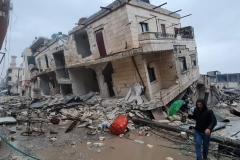
Negligence, not the soil, demolishes
Prof. Dr. Celalettin Kozanoğlu, Head of Department of Civil Engineering, Izmir University of Economics (IUE), stated that many buildings that were destroyed
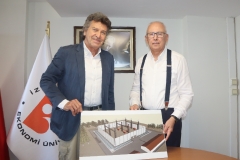
‘Firewall’ project
IUE Rector Prof. Dr. Murat Aşkar and Head of Department of Civil Engineering, Prof. Dr. Celalettin Kozanoğlu developed the ‘firewall’ project, which

